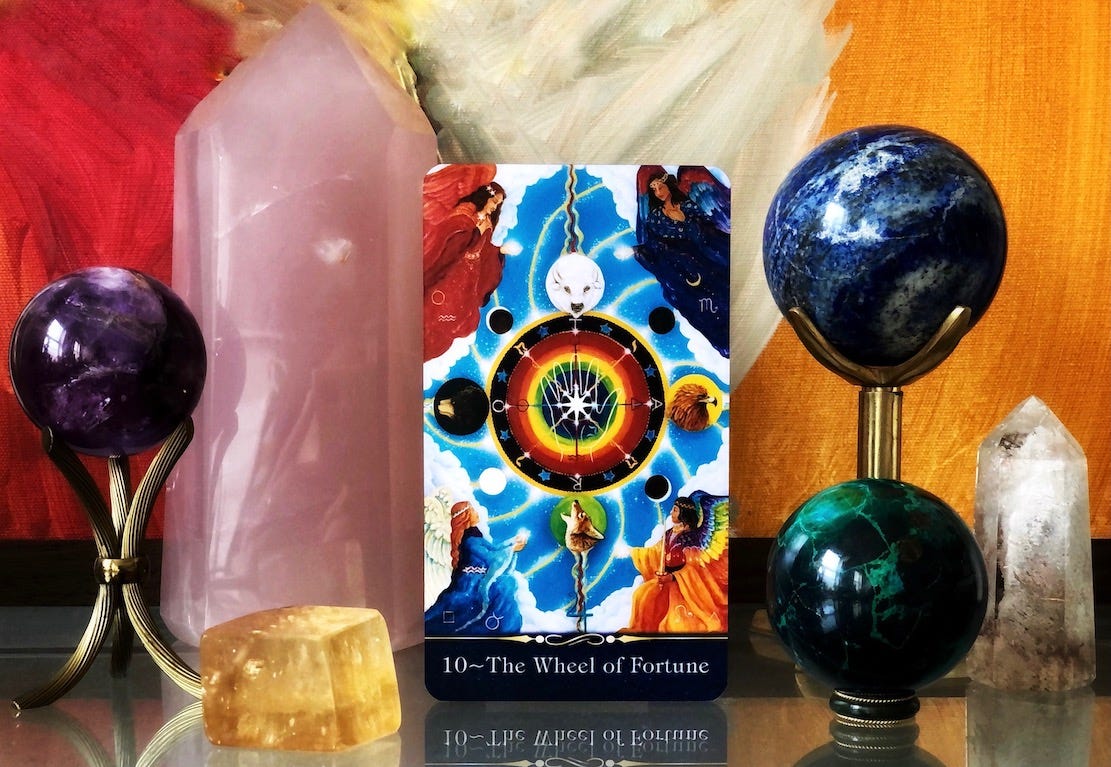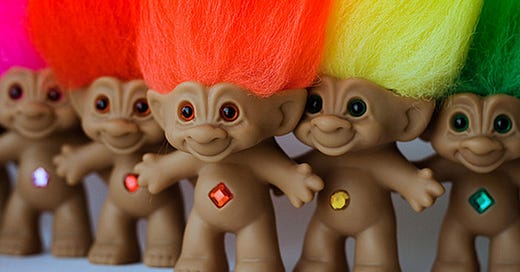I used to have a blog. Not many people read it, a fact I found both sad and comforting, because I could write whatever I wanted without the pressure to get it “right.” Screaming into the void can be remarkably therapeutic.
After I’d published work in a few other places on the world wide web (remember when people called it that?), my readership blossomed from ten readers I knew to a few hundred I didn’t. And that’s when the comments began.
Every time I shared a piece of writing — we’re talking two minutes after a post went live — a tiny barrage of insults would appear. Sometimes just one, sometimes a handful.
One week, an array of commenters, all sharing the names of von Trapp children, took turns offering feedback. On Monday, Marta called me a terrible writer. On Tuesday, Gretl said my jokes made her cringe. On Wednesday, Leisl said I tried too hard. On Thursday, someone named Elsa reiterated just how awful my writing was. Elsa is not the name of a von Trapp, but perhaps it seemed less conspicuous than Brigitta.
By Friday, I was so exasperated I took a break from posting. That break blossomed into a full-blown hiatus that lasted…until this newsletter.
For the next four years, I stopped writing anything that was purely for me. It’s not that the trolls broke my heart — mine was a fairly innocuous experience compared to what others have endured. They just made it feel pointless. My blog didn’t earn any money, I reasoned, so it wasn’t worth the headache. Instead, I only shared my words, whether publicly or anonymously, under the banner of other people’s names, other people’s brands, other people’s ventures.
Trolls: 1, Caroline: 0
As a kid in the pre-internet era, the only trolls in my orbit were Russ dolls (good trolls) and the one from The Three Billy Goats Gruff (bad trolls).
For anyone who needs a refresher (or who hasn’t read Billy Goats Gruff), it’s a Norwegian fairy tale where these goats just want to eat grass and live their lives, but in order to do so, they have to cross a bridge inhabited by a menacing troll. When the troll hears the clip-clop of the goats’ hooves overhead, he threatens to eat them. (Anyone who’s ever lived in an apartment with a downstairs neighbor that’s irritated by the sound of footfall will sympathize with the goats’ plight.) In the traditional, not-watered-down version, the story ends with the largest of the goats impaling the troll with its horns, then eating all the grass it pleases.
The moral of the story is clear: Mean trolls shall not win! But reality is not a fairy tale.
Internet trolls may hide behind their anonymity, but nothing on the internet is ever truly anonymous.
Because I am a totally well-adjusted person (sarcasm), one day in the not-too-distant past, I decided to go into the back end of my blog to find my trolls’ IP addresses and then plugged them into a little spreadsheet. There was an obvious pattern.
As it turns out, the comments were mostly the handiwork of one persistent troll. And, most surprising of all, it was a person I knew.
In a way, this discovery made the story better — the roomful of imaginary faces I’d envisioned were replaced with a lone familiar one. It also made it worse. Why did this person dislike me so much? What had I done that so offended them? The rational side of me knows that, as with any troll, their comments say more about them than they do about me. And so, I let it go.
Trolls are not confined to lurkers on the internet, nor do they always dwell beneath the proverbial bridge. They walk among us. The micromanaging boss who never seems pleased. The critical relative. The rude person on the sidewalk or in the supermarket aisle. The road rager who drives and acts so aggressively you know it has nothing to do with you (but it still manages to shake you). Then there are what I’ll call societal trolls, perpetrators of shared harm.
To state the obvious: Hurt people hurt people.
I have a theory that nearly everything we do is in some way a reflection of love, though not in a “love and light” kind of way. What I’m talking about is more of an emotional bank account, in which our actions reflect the balance at any given moment. An act of generosity or support reflects a positive balance, while an act of trolldom points to a deficit.
Love isn’t always heart-shaped — in my experience, it most often is not. Sometimes it gets twisted, contorted into something else. A knot or a fence or a slight.
I’m a big fan of writer, actor, and activist Jeffrey Marsh, who shares many wonderful teachings about positivity and inclusion on their social media accounts. One that particularly resonated with me is the idea that you can love someone you’ve never met: “If someone can hate me without knowing me, then I can love you even if we’ve never met… I have so much love in my heart that I don’t actually need to know anything else about you.”
If you are an empathic person, if you are affected by the news, if you feel emotional pangs at the loss of celebrities you’ve never met or posts about homeless animals, then you are already familiar with this feeling. Love, it turns out, isn’t limited to those we hold closest. Sometimes it seeps through our pores or out of our screens. Even silently. Even invisibly.
The act of loving, much like the act of forgiveness, isn’t a one-way ticket. It’s something that liberates you. This may be lost on a troll — internet and otherwise — and for this I am sorry. But I trust that they have their own stuff to work through, and I hope they find their way.
Some trolls may never climb out from under the bridge. But I send my love to them, anyway. Perhaps one day they’ll discover all there is to be found on the other side.
Card of the Week
Here is this week’s card for the collective, as well as some thoughts to carry into the days ahead. As most modern readers will tell you, the tarot is not about fortunetelling, nor is it about neat, definitive answers. The cards are simply one path to reflection, a way of better knowing ourselves and others through universal themes. If this reading resonates with you, great! And if not, no worries. Take whatever may be helpful and leave the rest.

When I first moved to New York City, it felt like anything could happen. Every outing felt like an adventure, and more often than not, it was. From chance encounters to celebrity sightings to poignant moments to getting cast on a reality show, I opened myself up to chance and let it find me.
The Wheel of Fortune knows a thing or two about possibility. It also knows quite a lot about life.
I generally don’t play favorites when it comes to cards, but this one definitely ranks up there. While most of the other twenty-two cards in the major arcana represent characters — the Magician, the Empress, the Hermit — or characteristics — Strength, Justice, Temperance — The Wheel of Fortune… is a wheel. Some people find this weird, or difficult to connect with. To me, it is perhaps the most unifying card of all.
The traditional reading for this card points to destiny or fate, a reminder that, much like on the game show of the same name, when the wheel spins, our luck can change in an instant. No matter how stagnant we may feel, unforeseen circumstances are at play, shuffling the deck and waiting to deal us a new hand.
Or, as a tarot reader once said to me upon pulling this card, “A bus is coming. The question is, are you going to get on it?”
This card also speaks to cycles, something many become especially attuned to at this time of year. Holidays, the change of seasons, thoughts of wrapping up one year and beginning another…all these things can bring awareness to both traditions and progress, as well as what we’d like to perpetuate.
Just as a wheel on a car turns over the ground, each time it comes around again, it’s in a new location. As long as it’s in motion, no point on the wheel can remain in the same position.
After nearly twenty years living in this city, that anything-can-happen feeling has largely faded. Anything could happen, but more often than not, it is someone peeing in public. This card suggests a change is definitely in order, though not necessarily a change in location. More likely, it is a change in perception.
The Wheel of Fortune gently (or, in some cases, not-so-gently) asks us to let go, to relinquish some of the control we are trying to exert over every little aspect of our lives. It reminds us that life is an adventure, and that adventure is largely a mindset. Luck may favor the prepared and fortune may favor the bold, but our animal bodies favor flexibility and forgiveness. As we go through our days, maintaining a balance is key.
The wheel turns and turns, unceasing — like a clock, like our planet, like nearly everything in the universe. It cannot be controlled or harnessed. It cannot be fully understood. The contemplation of this is both exciting and humbling, much like the nature of existence.
I recently read something that resonated with me that said grief is like a wave, reaching a crescendo and crashing on the shore. It abates and then returns, over and over. A wheel is a bit like that, too. There are high points and low points, and everything in between.
Wherever you may be on your own journey, this week’s message is clear, if a bit contradictory. Hold on. Let go. Stay the course. Ride the wave. It has everything to show you and it will take you where you need to go.
Thank you so much for reading! If you enjoyed this letter and would like to receive future installments in your inbox every Sunday, please consider becoming a subscriber.










Thank you, Arielle! I'm so glad you're here.
Thank you for writing these newsletters. I appreciate and enjoy them immensely.